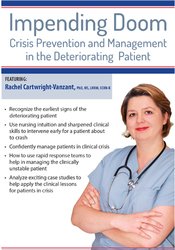

Do you as a nurse/clinician recall a patient who seemed to deteriorate in front of your eyes and wonder if anything could have prevented this clinical crisis?
What do you do with the subtle signs and symptoms you identify in your patient that are yet within normal limits but your nursing intuition tells you that there is something wrong?
How do you learn the early clinical signs of impending doom in the patient and effectively intervene before the crisis occurs?
Ideally, your job is not to run a good code but to prevent the code from ever happening. In order to do that, you have to know what the early warning signs are, perceive them, interpret them within the whole clinical picture, and act for the benefit of the patient.
Subclinical signs – the early first warning signals of a problem – are examined in this workshop. You will leave with a clearer understanding of the body’s complex, interrelated organ systems and be able to break them in to their component parts to understand how one organ system can cause a sign or symptom in another organ system.
Today’s nurses care for more patients with higher acuity than ever before. In order to forestall crisis, you have to know who is at risk and recognize the warning signs, however subtle they initially may be in appearance. Hindsight is 20/20. The art and science of nursing, the vital difference in effective nursing, is in the ability to “see it coming”. Rachel Cartwright-Vanzant, PhD, MS, LHRM, CCRN-K, will share with you effective and put-to-the-test strategies to detect clinical changes in the deteriorating patient.
NOTE: Tuition includes one free CE Certificate (participant will be able to print the certificate of completion after completing the on-line post-test (80% passing score) and completing the evaluation).
Continuing Education Information: Listed below are the continuing education credit(s) currently available for this non-interactive self-study package. Please note, your state licensing board dictates whether self-study is an acceptable form of continuing education. Please refer to your state rules and regulations. If your profession is not listed, please contact your licensing board to determine your continuing education requirements and check for reciprocal approval. For other credit inquiries not specified below, please contact cepesi@pesi.com or 800-844-8260 before the event.
Materials that are included in this course may include interventions and modalities that are beyond the authorized practice of your profession. As a licensed professional, you are responsible for reviewing the scope of practice, including activities that are defined in law as beyond the boundaries of practice in accordance with and in compliance with your profession's standards.
PESI, Inc. is a provider approved by the California Board of Registered Nursing, Provider #: 17118 for 6.0 self-study contact hours.
** You will need to provide your license number to PESI. PESI must have this number on file in order for your hours to be valid.
PESI, Inc. is an approved provider by the Florida Board of Nursing. Provider #: FBN2858. These materials qualify for 6.0 self-study contact hours.

PESI, Inc. is an approved provider by the Iowa Board of Nursing. Provider #: 346. Nurses successfully completing these self-study materials will earn 6.3 self-study contact hours. Please email cepesi@pesi.com with your license number, include the title, speaker name and date. PESI must have this number on file in order for your hours to be valid.
This self-study activity qualifies for 6.25 continuing education clock hours as required by many national, state and local licensing boards and professional organizations. Save your activity advertisement and certificate of completion, and contact your own board or organization for specific requirements.
| File type | File name | Number of pages | |
|---|---|---|---|
| 077490 Manual (2.41 MB) | 59 Pages | Available after Purchase |

Rachel Henderson, PhD, MS, RN, HCRM, is an expert speaker on topics focused on legal aspects of healthcare, nursing documentation, and regulatory compliance. Her 22 years as a legal nurse consultant, inpatient clinical nurse specialist and healthcare risk manager (HCRM) bring life to her presentations by sharing real case scenarios. She is a member of the National Speakers Association (NSA) and past president of the Florida Speakers Association (FSA). She is a published author in peer-reviewed journals and textbooks. In addition to owning a medical and legal consulting business, she has her PhD in Public Policy and Administration: Law and Policy. Rachel works with law firms and healthcare organizations, evaluating medical records for compliance with standards of care and applicable regulations. She has been an expert witness for medical negligence cases for both the plaintiff and the defense.
Speaker Disclosures:
Financial: Dr. Rachel Henderson has employment relationships with Medical Legal Concepts, Florida SouthWestern State College, and Palm Beach State College. She receives royalties as a published author. Dr. Henderson receives a speaking honorarium and recording royalties from PESI, Inc. She has no relevant financial relationships with ineligible organizations.
Non-financial: Dr. Rachel Henderson is a member of the American Association of Critical Care Nurses, the American Society of Healthcare Risk Managers, and the American Society of Professionals in Patient Safety.
Access never expires for this product.
Visit our FAQ page at www.pesi.com/faq or contact us at www.pesi.com/info
Sepsis Crisis
Cardiovascular Crisis
(Acute MI, Cardiogenic Shock, Pulmonary edema, TIA/CVA)
Anaphalaxis Crisis
Diabetic Crisis
(Ketoacidosis, Hyperosmolar Syndrome)
Pulmonary Crisis
(Status Asthmaticus, Acute Respiratory Failure)
Hypovolemic Crisis
(GI bleed, Trauma, Internal Bleeding)
Rapid Response Teams
Satisfaction Guarantee
Your satisfaction is our goal and our guarantee. Concerns should be addressed to: PO Box 1000, Eau Claire, WI 54702-1000 or call 1-800-844-8260.
ADA Needs
We would be happy to accommodate your ADA needs; please call our Customer Service Department for more information at 1-800-844-8260.
PESI Mobile App
Access CE trainings on your phone or tablet through our free mobile app. Choose video or audio-only versions of live webcasts and online courses from the world’s best instructors, and complete your CE requirements anywhere, anytime, at your own pace.
Please wait ...